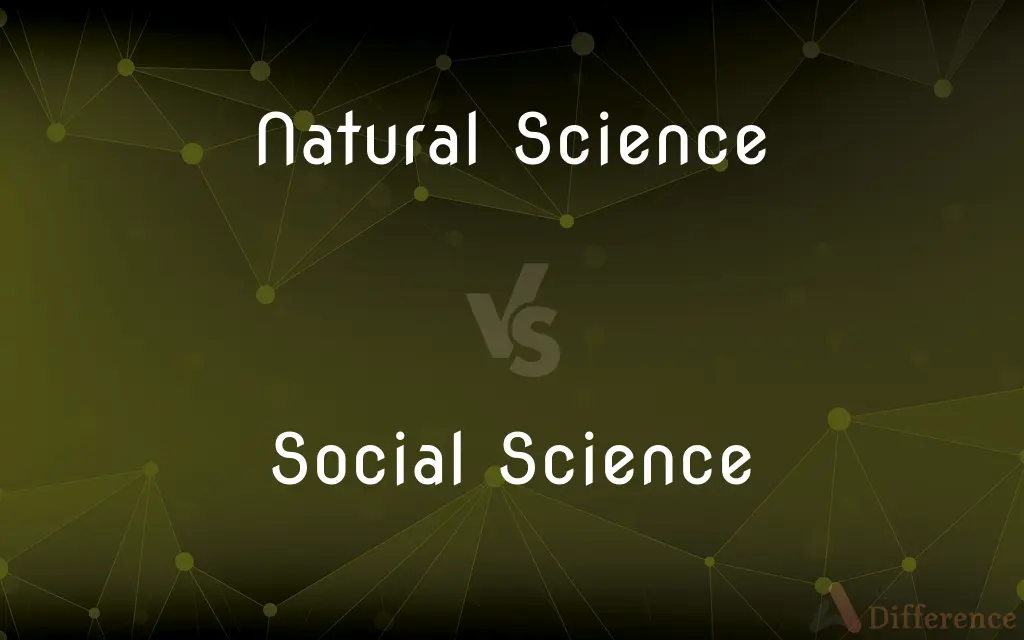Natural Science vs. Social Science — What's the Difference?
By Tayyaba Rehman & Fiza Rafique — Published on October 8, 2023
Natural Science: Studies the natural world and phenomena. Social Science: Examines human societies and behaviors.

Difference Between Natural Science and Social Science
Table of Contents
ADVERTISEMENT
Key Differences
Natural Science primarily deals with the systematic study of the natural world, covering aspects like matter, energy, and the fundamental forces of nature. It relies heavily on empirical evidence and the scientific method, aiming for objective truth and understanding. Disciplines such as physics, chemistry, biology, and geology fall under the Natural Science category.
On the flip side, Social Science delves deep into understanding human societies, their interactions, and behaviors. While it also employs systematic approaches, it often addresses complexities that can't be entirely quantified, like emotions or cultural nuances. Examples of Social Science disciplines include sociology, psychology, anthropology, and economics.
Natural Science generally emphasizes experiments, observations, and verifiable data. Through these processes, it aims to establish laws, like the law of gravity, which can predict and explain natural phenomena. Precision, repeatability, and the search for universal truths characterize its studies.
Conversely, Social Science often involves qualitative research, case studies, and interpretative methods, alongside quantitative ones. While it seeks patterns in human behavior, the conclusions might not be universally applicable due to cultural or social variations. It emphasizes understanding the reasons and motives behind human actions and societal trends.
In essence, while Natural Science focuses on understanding the physical world and its inherent properties, Social Science looks to unravel the intricacies of human societies and the various factors that shape them.
ADVERTISEMENT
Comparison Chart
Primary Focus
Natural world and phenomena
Human societies and behaviors
Typical Methods
Experiments, observations
Surveys, case studies, qualitative research
Universal Applicability
Often seeks universal laws
Context-specific findings due to human diversity
Examples of Disciplines
Physics, Chemistry, Biology
Sociology, Psychology, Anthropology
Reliance on Quantitative Data
Heavily reliant on quantitative data
Uses both quantitative and qualitative data
Compare with Definitions
Natural Science
Systematic exploration of nature.
Thanks to Natural Science, we understand how photosynthesis works.
Social Science
Addresses human complexities and motives.
Through Social Science, we gain insights into economic behaviors.
Natural Science
Disciplines investigating natural phenomena.
Chemistry, as a Natural Science, studies the composition of matter.
Social Science
Investigates human interactions and social structures.
Social Science research can shed light on societal norms.
Natural Science
Research based on empirical evidence.
Through Natural Science, we've learned about the laws of physics.
Social Science
Combines qualitative and quantitative methods.
Psychology, a Social Science, often uses surveys and case studies.
Natural Science
Seeks universal truths about nature.
Natural Science aims to predict and explain phenomena like volcanic eruptions.
Social Science
Aims to understand human dynamics.
Social Science helps us comprehend how propaganda can influence societies.
Natural Science
The study of the physical world.
Biology is a branch of Natural Science focusing on living organisms.
Social Science
The study of human societies and behaviors.
Anthropology, a Social Science, studies various human cultures.
Common Curiosities
Can Natural Science include human biology?
Yes, human biology is a part of Natural Science as it studies the human body and its functions.
Do Social Sciences only use surveys?
No, Social Sciences use a mix of methods including surveys, case studies, and both qualitative and quantitative research.
Why is empirical evidence crucial in Natural Science?
Empirical evidence ensures that findings in Natural Science are based on observable and replicable data.
Can Social Science findings apply to all human societies?
Not always. Social Science findings can be context-specific due to cultural and societal variations.
What is the main focus of Natural Science?
Natural Science focuses on studying the natural world and its phenomena.
Does Natural Science only study tangible things?
While Natural Science often focuses on tangible entities, it also studies intangible concepts like forces or energy.
How does Social Science differ in approach?
Social Science studies human societies, their interactions, and behaviors, often incorporating qualitative methods.
Which science, Natural or Social, uses the scientific method more?
Both use the scientific method, but Natural Science often has a heavier reliance on strict empirical methods.
Is mathematics a Natural Science?
Mathematics is foundational to many Natural Sciences but is typically considered its own discipline, separate from Natural Science.
What methods are unique to Social Science?
While not unique, Social Science often employs qualitative research, ethnography, and interpretative methods more frequently.
Are the findings of Natural Science universally applicable?
Natural Science often seeks universal truths, but there can be exceptions or areas of ongoing research.
Is psychology a Natural Science or a Social Science?
Psychology is generally considered a Social Science, though it has elements that overlap with Natural Science.
Are cultural studies a part of Social Science?
Yes, cultural studies often fall under Social Science disciplines like anthropology.
How can Social Science benefit societies?
Social Science provides insights into societal behaviors, helping inform policies and improve societal structures.
Are Natural Science and Social Science ever interconnected?
Yes, areas like environmental sociology or human biology showcase the interplay between both sciences.
Share Your Discovery

Previous Comparison
Regular Verbs vs. Irregular Verbs
Next Comparison
Personal Banking vs. Private BankingAuthor Spotlight
Written by
Tayyaba RehmanTayyaba Rehman is a distinguished writer, currently serving as a primary contributor to askdifference.com. As a researcher in semantics and etymology, Tayyaba's passion for the complexity of languages and their distinctions has found a perfect home on the platform. Tayyaba delves into the intricacies of language, distinguishing between commonly confused words and phrases, thereby providing clarity for readers worldwide.
Co-written by
Fiza RafiqueFiza Rafique is a skilled content writer at AskDifference.com, where she meticulously refines and enhances written pieces. Drawing from her vast editorial expertise, Fiza ensures clarity, accuracy, and precision in every article. Passionate about language, she continually seeks to elevate the quality of content for readers worldwide.
















































